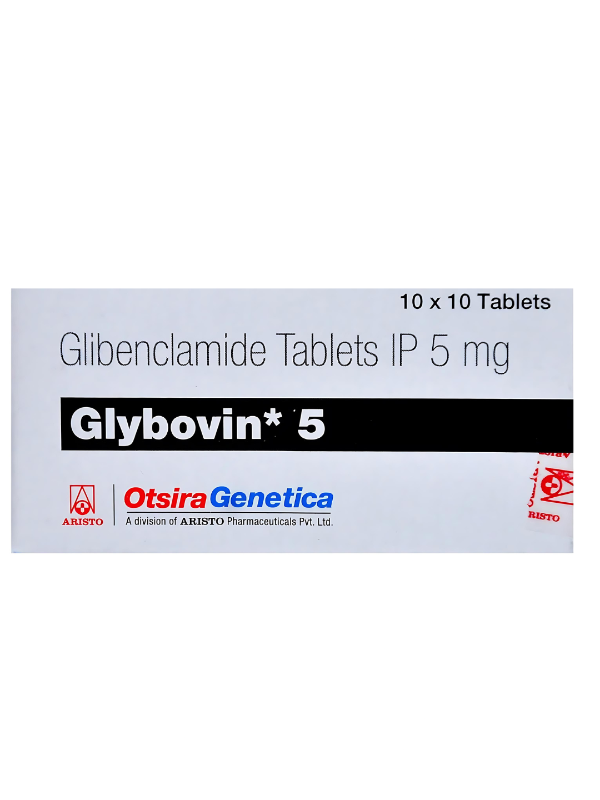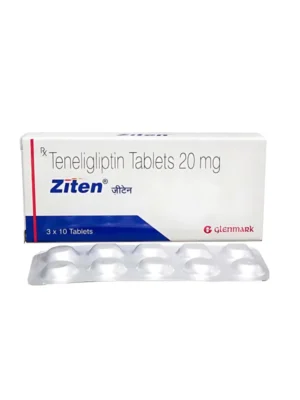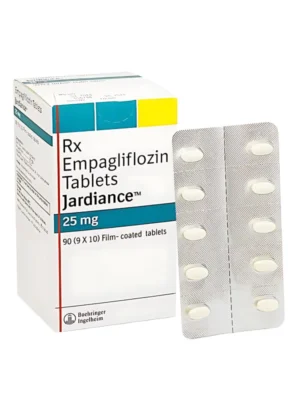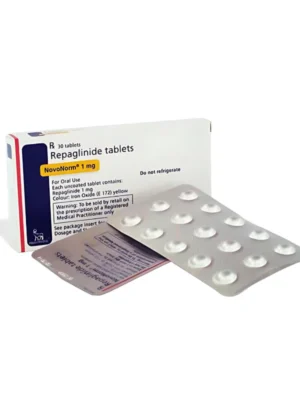Description
Glybovin 5 Tablet (Glibenclamide) – Oral Medication for Type 2 Diabetes
Glybovin 5 Tablet is a sulfonylurea-class antidiabetic medication used to manage Type 2 Diabetes Mellitus in adults. It stimulates pancreatic insulin production, helping regulate blood sugar levels and preventing long-term complications like kidney damage, vision loss, and neuropathy. This tablet should be taken with meals at consistent times daily. Unlike some diabetes medications, Glybovin carries a significant hypoglycemia risk, especially when combined with insulin or alcohol. Patients must recognize low blood sugar symptoms (sweating, dizziness, confusion) and carry fast-acting glucose sources. A comprehensive treatment plan including diet control, exercise, and regular blood sugar monitoring is essential for optimal results.
Uses of Glybovin 5 Tablet:
- Management of Type 2 Diabetes Mellitus
- Often prescribed alongside other antidiabetic drugs for enhanced glycemic control
Benefits of Glybovin 5 Tablet:
Glybovin effectively lowers blood glucose levels by boosting natural insulin secretion. Its long-acting formula provides sustained control, reducing risks of diabetes-related complications. Clinical studies show it helps maintain HbA1c targets when combined with lifestyle modifications.
Side Effects of Glybovin 5 Tablet:
- Common: Hypoglycemia, nausea, headache, dizziness
- Less common: Weight gain, gastrointestinal disturbances
Most side effects diminish as the body adjusts. Persistent symptoms require medical attention.
How to Use Glybovin 5 Tablet?
- Take with breakfast or first main meal daily
- Swallow whole – do not crush or chew
- Dosage adjustments may be needed based on blood sugar response
- Never skip meals while on this medication
How Glybovin 5 Tablet Works?
Glybovin contains glibenclamide, which binds to pancreatic beta cells, stimulating insulin release. This enhances glucose uptake by tissues and inhibits liver glucose production, effectively lowering blood sugar levels.
Safety Advice:
- Alcohol: Strictly avoid – increases hypoglycemia risk
- Pregnancy: Safe only if prescribed (limited human data)
- Breastfeeding: Monitor infant’s blood sugar if used
- Driving: Caution required due to dizziness risk
- Kidney Disease: Contraindicated in severe cases
- Liver Disease: Use with caution; avoid in severe impairment
What If You Missed a Dose?
If you miss a dose, take it with your next meal. Never double dose. If you skip a meal, skip that dose to prevent hypoglycemia.
FAQs:
Q1: Can Glybovin cause weight gain?
Yes, weight gain is possible due to increased insulin activity. Maintain strict diet control and regular exercise to mitigate this effect.
Q2: Is Glybovin safe for elderly patients?
Elderly patients require careful monitoring due to higher hypoglycemia risk. Dose adjustments are often necessary.
Q3: Can I take Glybovin if I’m allergic to sulfa drugs?
No. Glybovin contains sulfonylurea and is contraindicated in patients with sulfonamide allergies.
Q4: How does Glybovin differ from metformin?
Unlike metformin (which reduces liver glucose production), Glybovin stimulates insulin secretion. They’re often combined for synergistic effects.
Q5: What should I do if I experience hypoglycemia?
Consume 15-20g fast-acting glucose (juice, candy) immediately. Follow with complex carbs and protein. Seek medical help if symptoms persist.
Q6: Can Glybovin be used in Type 1 diabetes?
No. It’s only for Type 2 diabetes as it requires functioning pancreatic beta cells.
Q7: Why must I avoid alcohol with Glybovin?
Alcohol potentiates hypoglycemia and masks warning symptoms, increasing risk of dangerous blood sugar drops.








There are no reviews yet.